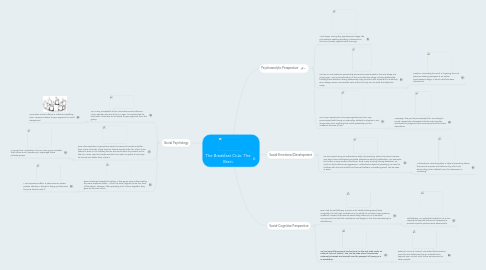
1. Social Psychology
1.1. He is very susceptible to the normative social influence. When Bender asks him if he's a virgin, he implies that he slept with Claire due to his desire to gain approval from the group.
1.1.1. Normative Social Influence: influence resulting from a person’s desire to gain approval or avoid disapproval
1.2. Brian demonstrates in-group bias when he views his friends as better than Claire's friends. Claire says her friends would make fun of her if she talked to Brian in the hallway and so she would have to pretend not to like him. Brain says his friends wouldn't care who he spoke to and says his friends are better than Claire's.
1.2.1. In group bias: evaluation of one's own group as better than others and a tendency to disparage those outside groups.
1.3. Brian's feelings towards the others in the group were influenced by the mere exposure effect. At first, he didn't appear to be too fond of the others, however after spending a lot of time together they grew to like each other.
1.3.1. Mere-exposure effect: a phenomenon where people develop a liking for things just because they are familiar with it.
2. Psychoanalytic Perspective
2.1. Anal Stage: during this psychosexual stage, the id's pleasure seeking tendency is focused on the anus (usually regards toilet training)
2.2. He has an anal-retentive personality because he was fixated in the anal stage at a young age. Some characteristics of the anal-retentive stage include deliberately holding back rebellion, being obsessively tidy, punctual and respectful to authority. Brain always wears nice sweater sets and is the only one to write the detention essay.
2.2.1. Fixation: according to Freud, a lingering focus of pleasure-seeking energies at an earlier psychosexual stage, in which conflicts were unresolved
2.3. He's very responsive to his superego because he's very preoccupied with being an exemplary student and person, and strays away from anything that could potentially put his academic success at risk.
2.3.1. Superego: the part of personality that, according to Freud, represents internalized ideals and provides standards for judgment (the conscience) and for future aspirations
3. Social-Emotional Development
3.1. He was raised using an authoritarian style of parenting, where his parent impose very strict rules and expect complete obedience without justification. For example, his mother is very insistent that Brian finds a way to study during detention, so much so that it becomes aggressive. Authoritarian styles of parenting can lead to children with less social-skills and low self-esteem, something which can be seen in Brian.
3.1.1. Authoritarian Parenting Style: a style of parenting where the parents impose and enforce very strict and demanding rules, without room for discussion or reasoning.
4. Social-Cognitive Perspective
4.1. Brian lost his self-efficacy as soon as he started failing wood shop. Originally, he had high confidence in his ability to maintain high grades in academic classes, but because wood shop was such an unfamiliar environment, he lost that confidence and began to fail, thus decreasing his self-efficacy.
4.1.1. Self-efficacy: an individual's belief in his or her capacity to execute behaviors necessary to produce specific performance attainments.
4.2. He had very little personal control over his life and lived under an external locus of control. This can be seen when he becomes extremely stressed and suicidal over the prospect of having an F in woodshop.
4.2.1. External Locus of Control: The belief that events in one's life are determined by an outside force beyond your control such as the environment or other people.
